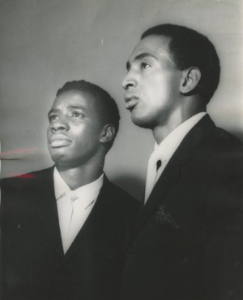No, they weren’t brothers in the fraternal sense. And even though they are often considered to be representatives of the Chicago soul sound, both Richard Dunbar and James Leon (Jimmy) Diggs are natives of Washington, DC. Dunbar and Diggs sang together in a group called the Starfires, which recorded for Decca in the late ’50s. Diggs also sang for a group called the Carltons that recorded for Argo, a Chess Records subsidiary, in ’64 and ’65. Both the Carltons and the Knight Brothers were signed by the New York office of Chess Records.
Argo released the Carltons final single, “I’m a Man,” in 1965 at about the same time that the Knight Brothers second single, “I Owe Her My Life” was released. Diggs sang on both records. Neither single set the world on fire, but the Carltons record did a little bit better than the Knight Brothers record, which was a bomb.
In 1965 the Knight Brothers came as close to the big time as they were going to get. That was the year they released their single “Temptation ‘Bout to Get Me”. Both “Temptation” and the B-side “Sinking Low” were written by Diggs, and the record was produced by Chess A&R director Billy Davis. While it did very well on the R&B chart, reaching a more than respectable #12, “Temptation” only managed a disappointing #70 on the pop chart. It’s a great record that deserved a better fate.
While the Knight Brothers would never again reach the Top 20 on the R&B chart, they didn’t stop trying, at least not right away. A follow up single called “The Hand of Faith” went nowhere in 1966. “That’ll Get It” followed on Checker Records, another Chess subsidiary, but also failed to gain any traction.
The Knight Brothers moved over to Mercury Records where they released two singles that were produced by Fountain Productions, a company owned by Jerry Butler. Neither “You’re My Love,” which was written by Diggs, or “Tried So Hard to Please Her” saw any success, and that ended the collaboration between Dunbar and Briggs.
The Knight Brothers became little more than a footnote in the glorious history of soul music, but things could have been different if their glorious single “Temptation ‘Bout to Get Me” would have received the attention it deserved from the record label. With a little bigger push the single could have, and should have, moved up the pop chart. The history of popular music is filled with countless such stories of the almost hits, and the near misses.





Comments